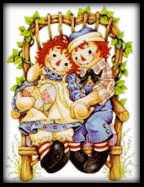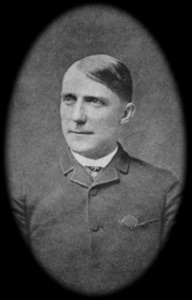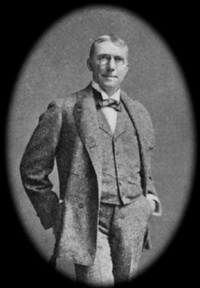James Whitcolm Riley (d. 1916)
"Our birth is nothing but our death begun, as tapers waste the moment they take fire." ~ Edward Young "I didn’t attend the funeral, but I sent a nice letter saying I approved of it." ~ Mark Twain
James Whitcomb Riley was born in 1849 in Greenfield, Indiana. He tried out many jobs in his youth, including sign painting and acting in a traveling medicine show.
In 1877 he went to work for the Anderson (Indiana) Democrat as a writer. Frustrated with the rejection letters for his verse he was receiving from eastern publications, he wrote a poem called “Leonainie” signed “E. A. P.” – for Edgar Allan Poe. The poem was quickly circulated, thus providing proof to a smug Riley that only poems written by “a genius known to fame” could be published. When he revealed that it was a hoax he was promplty fired – but not because of the deception. The editor of a rival paper, the Kokomo Dispatch, was the one who had linked poem to Poe, thus achieving attention the editors of the Anderson Democrat thought they deserved.
Leonainie — Angels named her;
And they took the light
Of the laughing stars and framed her
In a smile of white;
And they made her hair of gloomy
Midnight, and her eyes of bloomy
Moonshine, and the brought her to me
In the solemn night.
Riley was despondent and his creativity was drowned in the tide of criticism. His spirits turned, however, when several critics realized the beauty of the verse. One stated, “Those who love witch tales and eerie things like to think that the soul of Poe worked its way up through Riley in the ‘Leonainie’ poem.” A young college student from Sandusky, Ohio set the poem to music and sang it beautifully for a stunned crowd – which included Riley by way of some complementary tickets – at the Masonic Hall in Greenfield.
His talent and notoriety soon landed him another job with the Indianapolis Journal writing poetry under the pen name, “Benj. F. Johnson”. Needing encouragement, he sent some of his work to Henry Wadsworth Longfellow, who promptly sent back a short but very encouraging letter. This spurred Riley into some of his best work – some of these poems were published into a book entitled “The Old Swimmin’ Hole and ‘Leven More Poems” in 1883. The most famous of these , “When the Frost Is on the Punkin” established a unique voice in poetry: the use of down-home Indiana dialect and a knowlege of rural life to paint pictures of childhood in simple times. As Americans struggled with the impact of the industrial age, they looked for reminders of their childhood and what had been lost – and Riley would be there.
When the frost is on the punkin and the fodder’s in the shock,
And you hear the kyouck and gobble of the struttin’ turkey-cock,
And the clackin’ of the guineys, and the cluckin’ of the hens,
And the rooster’s hallylooyer as he tiptoes on the fence;
O, it’s then’s the times a feller is a-feelin’ at his best,
With the risin’ sun to greet him from a night of peaceful rest,
As he leaves the house, bareheaded, and goes to feed the stock,
When the frost is on the punkin and the fodder’s in the shock.
They’s something kindo’ harty-like about the atmusfere
When the heat of summer’s over and the coolin’ fall is here —
Of course we miss the flowers, and the blossums on the trees,
And the mumble of the hummin’-birds and buzzin’ of the bees;
But the air’s so appetizin’; and the landscape through the haze
Of a crisp and sunny morning of the airly autumn days
Is a pictur’ that no painter has the colorin’ to mock —
When the frost is on the punkin and the fodder’s in the shock.
The husky, rusty russel of the tossels of the corn,
And the raspin’ of the tangled leaves, as golden as the morn;
The stubble in the furries — kindo’ lonesome-like, but still
A-preachin’ sermons to us of the barns they growed to fill;
The strawsack in the medder, and the reaper in the shed;
The hosses in theyr stalls below — the clover overhead! —
O, it sets my hart a-clickin’ like the tickin’ of a clock,
When the frost is on the punkin, and the fodder’s in the shock!
Then your apples all is gethered, and the ones a feller keeps
Is poured around the celler-floor in red and yeller heaps;
And your cider-makin’s over, and your wimmern-folks is through
With their mince and apple-butter, and theyr souse and saussage, too!
I don’t know how to tell it — but ef sich a thing could be
As the Angles wantin’ boardin’, and they’d call around on me —
I’d want to ‘commodate ’em — all the whole-indurin’ flock —
When the frost is on the punkin and the fodder’s in the shock!
~ “When the Frost Is on the Punkin” by James Whitcomb Riley; a poem about harvest time on the farm.
For the non-Hoosier:
- “Punkin” is a colloquial version of “pumpkin”.
- “Fodder” is livestock feed, as in dried corn, and a “shock” is a heap in the field.
- “Guineys” are Guinea fowl, small birds raised for their meat.
- “Hallylooyer” is hallelujah.
- “Tossels” are corn tassels, the flax-like ends of corn ears.
- “Furries” is furrows, “meader” is meadow, and “wimmern-folks” is “women-folks”.
- “Mince” refers to mincemeat pie, and “souse” refers to pickled foods.
- “Boardin’” a meal, as in the “board” part of “room and board”.
 He achieved great fame for writing two poems in particular. “Little Orphant Annie”, was probably the most popular – a poem about a young girl who comes to live with the family. It was later adapted into a Broadway musical, a comic strip and several movies.
He achieved great fame for writing two poems in particular. “Little Orphant Annie”, was probably the most popular – a poem about a young girl who comes to live with the family. It was later adapted into a Broadway musical, a comic strip and several movies.
The second poem, “The Raggedy Man” has an interesting side story. Graphic artist and illustrator Johnny Gruelle, who moved to Indianapolis from Arcola, IL around the turn of the century, would become friends with Riley through his parents . Later in life, his daughter would find a small faceless doll in her grandmother’s attic. This doll would inspire Gruelle to create a new cartoon. Reaching for a book of poems by Riley, he compressed the titles of two of his favorites, “The Raggedy Man” and “Little Orphant Annie” to create “Raggedy Ann” – a story and doll that is known and loved by millions to this day. Riley also authored several other books of poetry oriented to the young, which gained him the reputation as the “children’s poet”.
When he died on July 22, 1916, tens of thousands of people walked past his casket as he lay in state under the rotunda of the Indiana State Capital. He is buried in section 61, lot 1 at Crown Hill.
Besides several schools and parks, the world-renown Riley Hospital for Children in Indianapolis is named after him.
“The Song Of Yesterday”, a poem about growing old.
by James Whitcomb RileyI
But yesterday
I looked away
O’er happy lands, where sunshine lay
In golden blots,
Inlaid with spots
Of shade and wild forget-me-nots.My head was fair
With flaxen hair,
And fragrant breezes, faint and rare,
And, warm with drouth
From out the south,
Blew all my curls across my mouth.And, cool and sweet,
My naked feet
Found dewy pathways through the wheat;
And out again
Where, down the lane,
The dust was dimpled with the rain.II
But yesterday! —
Adream, astray,
From morning’s red to evening’s dray,
O’er dales and hills
Of daffodils
And lorn sweet-fluting whippoorwills.I knew nor cares
Nor tears nor prayers —
A mortal god, crowned unawares
With sunset — and
A scepter-wand
Of apple-blossoms in my hand!The dewy blue
Of twilight grew
To purple, with a star or two
Whose lisping rays
Failed in the blaze
Of sudden fireflies through the haze.III
But yesterday
I heard the lay
Of summer birds, when I, as they
With breast and wing,
All quivering
With life and love, could only sing.My head was leant
Where, with it, blent
A maiden’s, o’er her instrument;
While all the night,
From vale to height,
Was filled with echoes of delight.And all our dreams
Were lit with gleams
Of that lost land of reedy streams,
Along whose brim
Forever swim
Pan’s lilies, laughing up at him.IV
But yesterday! …
O blooms of May,
And summer roses — where away?
O stars above;
And lips of love,
And all the honeyed sweets thereof! —O lad and lass,
And orchard pass,
And briered lane, and daisied grass!
O gleam and gloom,
And woodland bloom,
And breezy breaths of all perfume! —No more for me
Or mine shall be
Thy raptures — save in memory, —
No more — no more —
Till through the Door
Of Glory gleam the days of yore.









1 Comment
Jump to comment form | comment rss [?] | trackback uri [?]